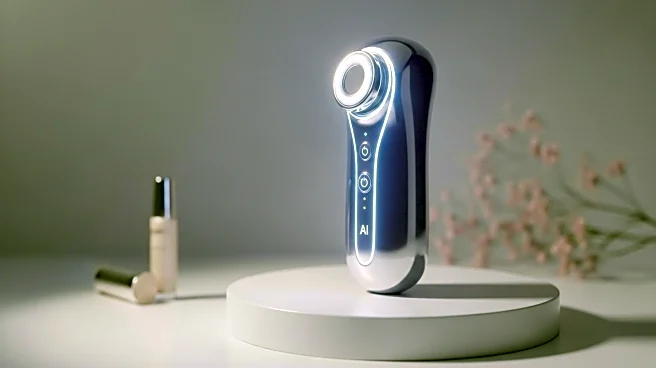What is the story about?
What's Happening?
A recent report by Accenture reveals that 76% of beauty consumers are open to using AI-powered personal shoppers. The study highlights a shift in consumer behavior, with generative AI becoming a primary channel for beauty product discovery. Consumers are increasingly using AI assistants to ask personalized questions, moving away from traditional keyword searches. The report surveyed over 18,000 global consumers, including 1,400 focused on beauty, and found that 83% of active AI users rely heavily on AI-driven results for product opinions. This trend indicates a growing trust in AI-generated recommendations, which are seen as personalized and helpful.
Why It's Important?
The integration of AI in the beauty industry signifies a major shift in how products are marketed and sold. As consumers embrace AI for personalized shopping experiences, beauty brands must adapt by optimizing their product content for AI algorithms. This includes ensuring that images, descriptors, and packaging visuals are suitable for AI recommendations. The emotional engagement offered by AI is also driving brand loyalty, with consumers valuing personalized experiences. This shift presents opportunities for beauty companies to innovate and differentiate their offerings, potentially leading to increased sales and customer retention.
What's Next?
Beauty brands are advised to implement knowledge management systems to make their content accessible to AI models. Regular evaluations of AI outputs are recommended to ensure accurate brand representation. Companies like Noli, backed by L’Oréal, are already leveraging AI to provide personalized beauty recommendations, setting a precedent for scalable personalization in the industry. As AI continues to evolve, beauty brands will need to focus on emotional engagement and personalized experiences to maintain consumer loyalty and stay competitive.
Beyond the Headlines
The rise of AI in beauty shopping could lead to ethical considerations regarding data privacy and the accuracy of AI recommendations. As AI becomes more integrated into consumer experiences, brands must ensure transparency in how data is used and maintain consumer trust. Additionally, the shift towards AI-driven shopping may impact traditional retail models, prompting stores to innovate their in-person experiences to complement digital interactions.















